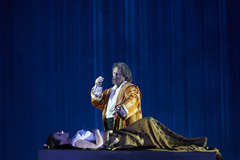| Opera Reviews | 4 May 2024 |
Juan Diego Flórez is the standout in Rossini's Otello in Milanby Silvia Luraghi |
|
| Rossini: Otello Teatro alla Scala, Milan 10 July 2015 |
|
|
For a modern audience, it is of course impossible to avoid comparison between this opera and the more famous version by Verdi, and even more between Berio di Salsa’s and Arrigo Boito’s libretti, a comparison which can be seen as an easy win for Verdi/Boito. Rossini’s version has its strengths especially in the vocal score, as the libretto, which largely deviates from Shakespeare’s tragedy, lacks theatrical force, and does not display the in-depth psychological analysis that both Shakespeare and Boito could work out for their characters. Unfortunately, the Jürgen Flimm’s production presented at La Scala does not help overcome the shortcomings of the libretto. Set in a large hall with tall gray walls also by Flimm, who designed the sets based on an idea of Anselm Kiefer, in a grayish dim light by light designer Sebastian Alphons, the action remains limited. The curtain opens on a party of funereal looking old men in great coats sitting at a table. The Venetian Doge, a crippled old man, comes in and members of the chorus cheer Otello’s entrance standing in a row at the front of the stage. Desdemona’s wedding takes place in the empty hall at the center of the stage, and the sets remain the same even in the third act, when the appearance of a gondola suggests an outdoors setting. Various extras, whose function is not clear, interact with the singers in an equally unclear manner. Desdemona seems uncertain between Otello and Roderigo, and kisses both men in the second act. The 19th century costumes by Ursula Kudrna contribute more gray tones, with some color only for Emilia, whose dress looks like a large lampshade and Desdemona, with a rather kitschy feather gown. Conductor Muhai Tang should have been a plus, as he had already conducted the opera in Zürich, but at La Scala remained quite disappointing, failing to add drive to the performance. As for the singers, Rossini’s Otello features three tenor roles, with Roderigo assigned a much more relevant part than by Shakespeare or Verdi. In this role, Juan Diego Flórez stood out as the absolute best: his flawless performance and his shining, technically perfect voice deserved several rounds of applause. Gregory Kunde in the title role turned out to be well cast theatrically, and mastered the demanding score, despite a somewhat irregular emission in the middle range. The third tenor, Jago, was Edgardo Rocha, who had already sang this role in Zürich and displayed an interesting and perfectly tuned voice. Olga Peretyatko as Deesdemona was technically very well prepared, but monotonous in her interpretation. Annalisa Stroppa as Emilia deserves mention both for her vocal and her theatrical skills, as does bass Roberto Tagliavini as Desdemona’s father Elmiro. At the end, all the singers were successful, with Flórez receiving a well deserved ovation, while the conductor did not earn much appreciation from the audience.
|
|
| Text ©
Silvia Luraghi Photo © Teatro alla Scala |

 Gioacchino Rossini wrote his Otello in 1816, and the opera was revived in theaters across Europe until the 1880s. After that, it shared the fate of other opere serie by the same composer, and disappeared until the Rossini renaissance in the 1950s led to its re-discovery. At La Scala, it premiered in 1823 and was revived until 1870; this should be enough to mark the current production as one of the season’s highlights for the Milanese company.
Gioacchino Rossini wrote his Otello in 1816, and the opera was revived in theaters across Europe until the 1880s. After that, it shared the fate of other opere serie by the same composer, and disappeared until the Rossini renaissance in the 1950s led to its re-discovery. At La Scala, it premiered in 1823 and was revived until 1870; this should be enough to mark the current production as one of the season’s highlights for the Milanese company.





